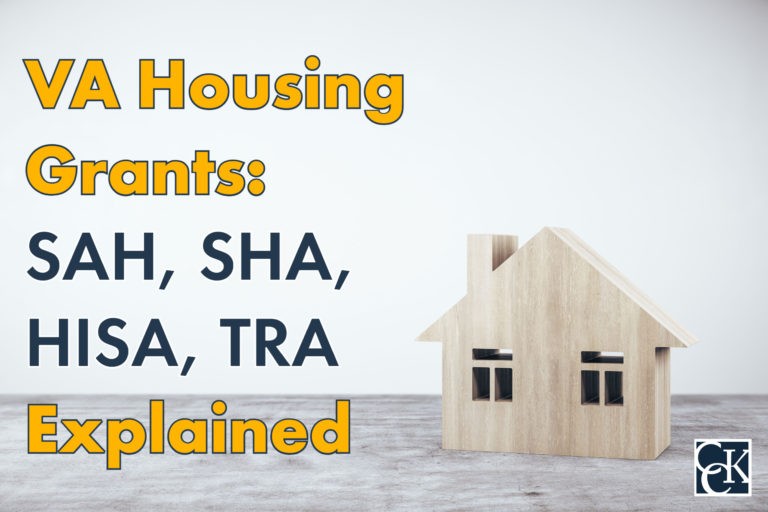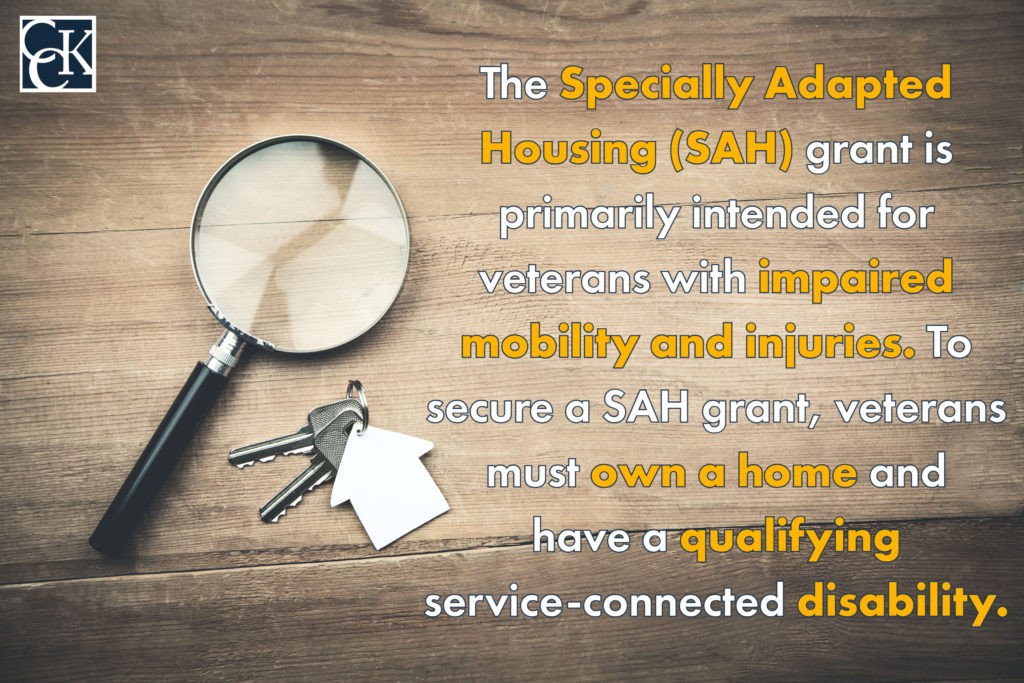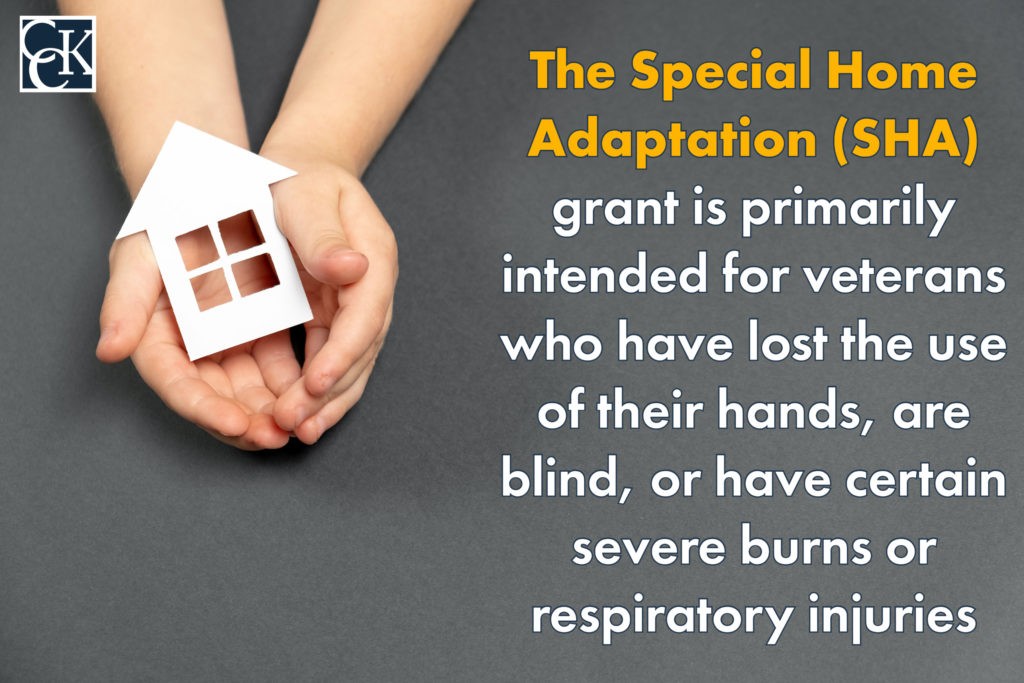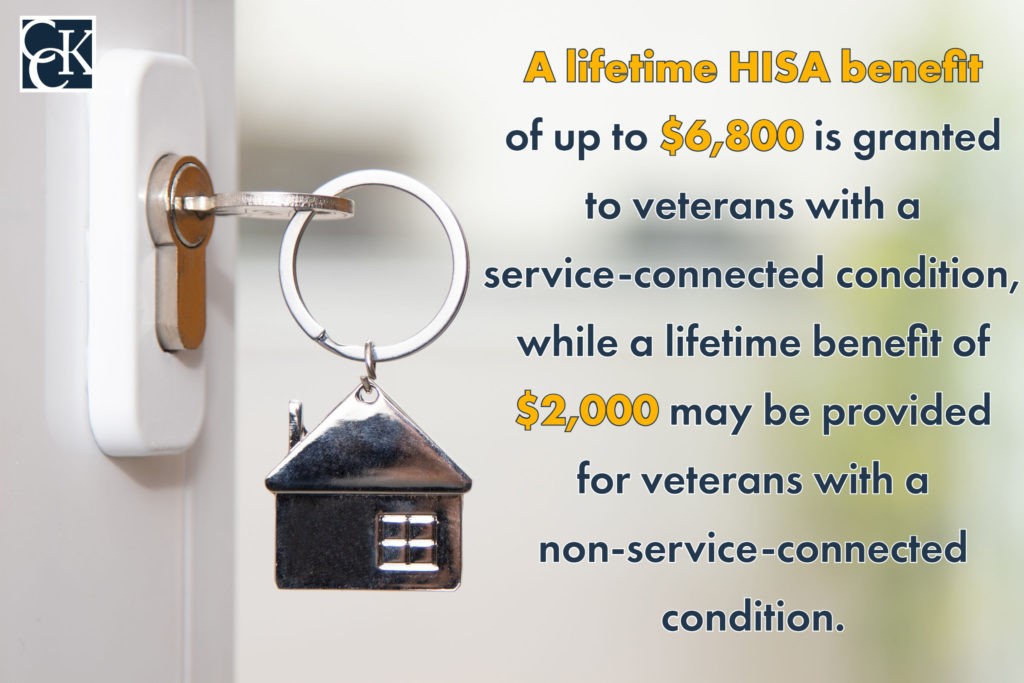VA Housing Grants: SAH, SHA, HISA, TRA Explained

CCK Law: Our Vital Role in Veterans Law
The U.S. Department of Veterans Affairs (VA) currently offers four types of housing allowances to qualifying veterans: Specially Adapted Housing (SAH) Grant, Special Home Adaptation, (SHA) Grant, Temporary Residence Adaptation (TRA) Grant, and the Home Improvements and Structural Alterations (HISA) Grant.
These housing grants are typically reserved for veterans with 100 percent disabling conditions or other combinations of disabilities.

What Is a VA Disability Housing Allowance?
A VA disability housing allowance is intended for veterans with severe injuries or illnesses who need to remodel, build, or purchase an adapted home to better suit their medical needs.
The grant, usually ranging between $2,000 and $100,000, can be used to make medically necessary improvements and structural alterations on a veteran’s primary residence. The amount VA awards is contingent on the veteran’s specific disability and current living situation.
If you have a qualifying condition and would like to adapt your home to better accommodate your disability, you can apply for one of the following VA housing grants:
VA Specially Adapted Housing (SAH) Grant
The Specially Adapted Housing (SAH) grant is primarily intended for veterans with impaired mobility and injuries. To secure a SAH grant, veterans must own a home (or owned by a member of their family) and have a qualifying service-connected disability, such as:
- Loss or loss of use of two or more limbs
- Loss or loss of use of a lower extremity with lasting residuals of an organic disease or injury
- Note: VA sets a cap for how many veterans can get benefits based on the loss of one extremity. Currently, only 120 veterans per fiscal year can receive SAH compensation.
- Blindness in both eyes (i.e., 20/200 visual acuity or less)
- Severe burn injuries
- Loss or loss of use of a foot or leg after September 11, 2001 (i.e., unable to move around without braces, crutches, canes, or a wheelchair)
SAH Housing Allowance Benefits
A SAH grant offers up to $100,896 for the 2021 fiscal year (i.e., October 1 through September 30). These funds can be used to buy or build a specialty home or adapt a permanent home to better serve a disabling condition.
Veterans can use the money up to six times throughout their lifetime. Essentially, this means that if you do not use all the money right away, you can access the funds again in the future.
VA Special Home Adaptation (SHA) Grant
The Special Home Adaptation (SHA) grant is primarily intended for veterans who have lost the use of their hands, are blind, or have certain severe burns or respiratory injuries. To qualify for the SHA grant, veterans must own or intend to own a permanent home and have one of the following service-connected conditions:
- Loss or loss of use of both hands
- Severe burn injuries
- Certain respiratory conditions
SHA Housing Allowance Benefits
Similar to SAH, veterans who qualify for SHA can use the funds to buy, build, or adapt their existing home to suit the needs of their disability. VA currently offers up to $20,215 for the SHA grant in the 2021 fiscal year.
Veterans can apply for both SAH and SHA if eligible. SHA benefits can also be used in future years if the full amount is not needed right away.
VA Temporary Residence Adaptation (TRA) Grant
Veterans who qualify for SAH or SHA but do not live or plan to live in a permanent home can apply for a Temporary Residence Adaptation (TRA) grant. This grant can be used to adapt a temporary or family member’s home to meet the needs of one of the above specified disabilities.
Veterans who qualified for an SAH grant can receive up to $40,637 through TRA for the fiscal year 2021, and veterans who qualified for SHA can collect up to $7,256.
VA Home Improvements and Structural Alterations (HISA) Grant
Unlike the other three VA housing allowances, the Home Improvements and Structural Alterations (HISA) grant does not require the veteran’s disabling condition to be incurred during active military duty. However, veterans applying for this grant must have a condition rated at least 50 percent disabling by VA.
VA HISA Housing Allowance Benefits
A lifetime HISA benefit of up to $6,800 is granted to veterans with a service-connected condition, while a lifetime benefit of $2,000 may be provided for veterans with a non-service-connected condition.
HISA grants can be used to improve the following areas of a veteran’s primary residence to meet their medical needs:
- Entrances and exits from the home
- Lavatory and sanitary facilities
- Kitchen or bathroom sinks and counters (e.g., lowering counters for accessibility)
- Paths and driveways (e.g., constructing permanent ramps)
- Improving plumbing and electrical systems for installing home medical equipment
VA also provides a list of improvements HISA will not pay for, including:
- Walkways to exterior buildings
- Jacuzzis or hot tubs
- Exterior decks
- Home security systems
- Removable equipment and appliances
- And more.
How to Apply for a VA Housing Grant
To apply for a SAH, SHA, or TRA housing allowance, you can download and fill out VA Form 26-4555. You can also check the status of your grant application through VA’s eBenefits portal.
VA may also require a prescription for housing improvements from a qualified medical professional or VA physician. To apply for a HISA housing allowance, visit this website to learn more and fill out VA Form 10-0103—Veterans Application for Assistance in Acquiring Home Improvement and Structural Alterations.
Was Your VA Disability Claim Denied?
If your VA disability claim and associated benefits have been denied, an accredited agent or attorney at Chisholm Chisholm & Kilpatrick LTD may be able to help you gather supporting evidence and file your appeal.
Reach out to CCK today to learn more about the services we offer. You can also schedule a free case review to see if we can help you with the appeals process at 800-544-9144.
About the Author
Share this Post



